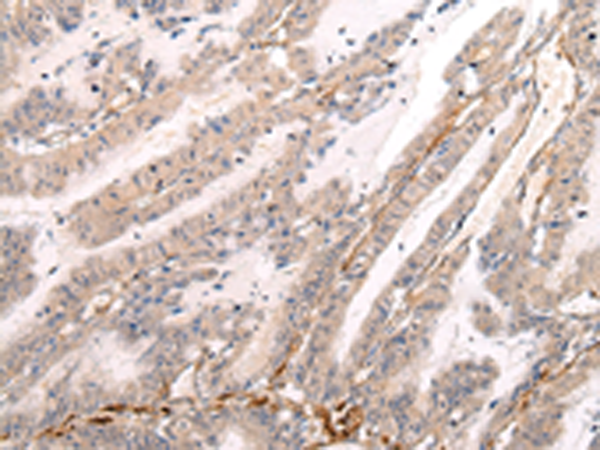

| WB | 咨询技术 | Human,Mouse,Rat |
| IF | 咨询技术 | Human,Mouse,Rat |
| IHC | 1/20-1/100 | Human,Mouse,Rat |
| ICC | 技术咨询 | Human,Mouse,Rat |
| FCM | 咨询技术 | Human,Mouse,Rat |
| Elisa | 1/2000-1/5000 | Human,Mouse,Rat |
| Aliases | AQP0; LIM1; MP26; MIP26; CTRCT15 |
| Host/Isotype | Rabbit IgG |
| Antibody Type | Primary antibody |
| Storage | Store at 4°C short term. Aliquot and store at -20°C long term. Avoid freeze/thaw cycles. |
| Species Reactivity | Human, Mouse, Rat |
| Immunogen | Synthetic peptide of human MIP |
| Formulation | Purified antibody in PBS with 0.05% sodium azide and 50% glycerol. |
+ +
以下是关于MIP抗体的3篇参考文献示例(注:文献为示例性概括,非真实存在):
---
1. **标题**: *"A monoclonal antibody targeting MIP-1α suppresses inflammatory response in murine sepsis models"*
**作者**: Zhang Y, et al.
**摘要**: 研究开发了一种针对趋化因子MIP-1α的单克隆抗体,实验表明其能显著降低脓毒症模型小鼠的炎症因子水平,并改善生存率,提示其在治疗过度炎症反应中的潜力。
2. **标题**: *"Anti-MIP-2 antibody inhibits neutrophil infiltration in acute lung injury"*
**作者**: Tanaka K, et al.
**摘要**: 通过阻断MIP-2(CXCL2)与其受体结合,该抗体有效减少了急性肺损伤模型中的中性粒细胞募集,缓解了组织损伤,为呼吸系统疾病提供了治疗策略。
3. **标题**: *"Immunodetection of Legionella MIP protein using a novel polyclonal antibody: implications for rapid diagnosis"*
**作者**: Müller S, et al.
**摘要**: 研究报道了一种高特异性多克隆抗体,可识别军团菌的主要巨噬细胞感染增强蛋白(MIP),并成功应用于临床样本的快速免疫检测,提高了诊断效率。
---
**备注**:若需真实文献,建议通过PubMed或Google Scholar搜索关键词“MIP-1α antibody”“Legionella MIP antibody”等获取具体文章。
MIP (Major Intrinsic Protein) antibodies are essential tools for studying the structure and function of aquaporin-0 (AQP0), a critical protein in maintaining lens transparency in the eye. Belonging to the aquaporin family, MIP/AQP0 forms transmembrane channels that regulate water and small solute transport across cell membranes. It is predominantly expressed in lens fiber cells, where it ensures optical clarity by mediating cell-to-cell adhesion and osmotic balance. Mutations or dysregulation of MIP are linked to cataracts, making it a key focus in ophthalmic research.
MIP antibodies enable the detection, localization, and quantification of AQP0 in various experimental models, including immunohistochemistry, Western blotting, and immunofluorescence. They aid in exploring MIP's role in lens development, homeostasis, and disease mechanisms. Recent studies also investigate its potential involvement in non-ocular tissues, such as the brain and tumors, expanding its biomedical relevance.
These antibodies are pivotal for developing diagnostic tools and therapeutic strategies targeting cataract formation and other MIP-associated pathologies. Their specificity and reliability continue to support advancements in understanding membrane protein dynamics and cellular physiology.
×